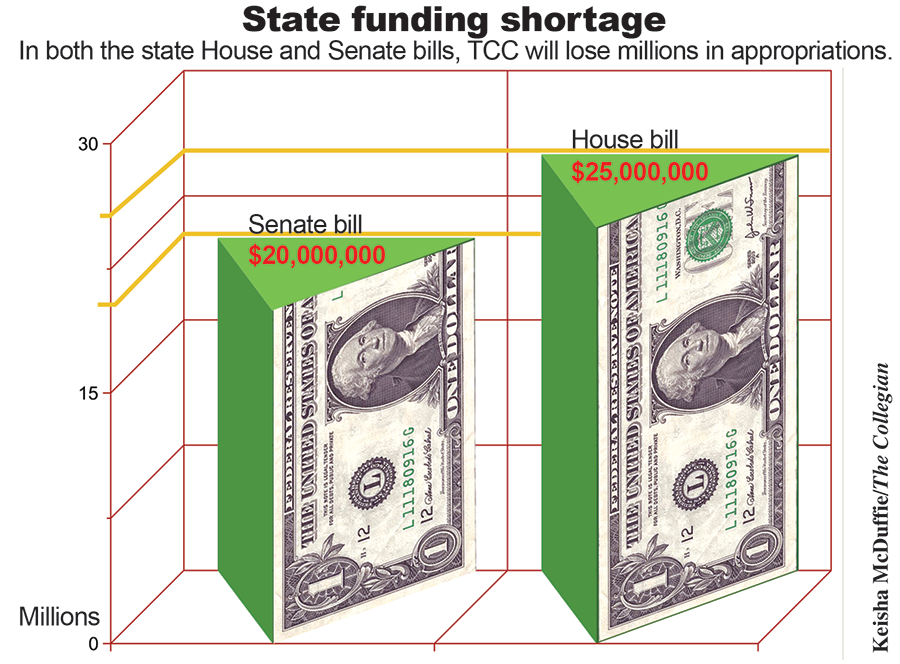
Casey Holder/The Collegian
By Tristan Evans/south news editor
Jennifer Abrams woke up March 4 and immediately prayed.
She asked God to bring the right words to her mouth later that day when, as a student, she would present on balancing multiple roles to the members of the Texas Association of Black Personnel in Higher Education.
She had taken a speech class before and had practiced in front of friends and family, but this was something that she would have never imagined herself doing a year ago.
When the time came for her to present, Abrams still felt a little uneasy.
“I had nerves,” she said. “It took me a while to adjust to it, even though I practiced.”
Abrams was provided this opportunity by the South Campus Village Mentoring Program, which provides personal and academic assistance to students. It is geared toward minority students.
“It was a way for us to professionally give back,” South Campus counselor Annie Dobbins said.
While at a state meeting of the Texas Association of Black Personnel in Higher Education in spring 2009, South Campus President Ernest Thomas and Chancellor Erma Johnson Hadley charged Dobbins and some of her fellow faculty members with creating a mentoring program for the African-American students of South Campus.
That charge led to the creation of the Village Mentoring Program within Tarrant County’s chapter of the association.
Dobbins said mentoring allows people to grow and exchange important knowledge with one another.
“Mentoring works both ways,” she said. “The mentor and the mentee learn from each other.”
After recruiting students and faculty to participate in the program, Dobbins and her team created manuals and provided training sessions for the mentors and the mentees to teach them how to interact with one another.
In fall 2010, the mentors and mentees were matched with each other and met in person at a reception.
Nicole Minor, South coordinator of academic support services, mentors Andre Walker, who plans on majoring in communications. Walker said his mentor has been an invaluable resource.
“She motivates me to take advantage of the resources available to me and to participate in things going on around campus,” he said.
Minor is also impressed with her mentee and said she has enjoyed watching him blossom. She described the mentors as cheerleaders for the academic success of the mentees.
“He’s making great strides,” Minor said. “I really enjoy helping our students, and I feel blessed to be a part of this program.”
Minor has even set up a series of informational interviews with professionals working in the communications field. Recently, Walker had the opportunity to meet with Star-Telegram editor and columnist Bob Ray Sanders.
“I want to help him reach his full potential,” Minor said of her mentee.
Dr. Natalie Johnson, South associate professor of mathematics and president of the local chapter of the association, was also charged with helping create the mentoring program. She said this program will help change the stigma that faculty members don’t support students enough. Johnson said it is beneficial to the students’ academic life to be mentored.
“It’s a key element,” she said. “I wouldn’t be in my position if I didn’t have mentors to mentor me.”
During this year’s conference, four students in the mentoring program gave presentations on some of the barriers minorities face in higher education. This was the first time in the association’s history that students presented.
South student Randall McCray discussed the pitfalls for African-American college students and solutions to deal with these pitfalls.
McCray said that while he was nervous at first, he felt confident after practicing a few times.
“I felt good while giving my speech,” he said. “I think it went well, and I’m glad I communicated the message in the right way.”
Aaron Eastern, who talked about maintaining cultural integrity, said he wasn’t too nervous and enjoyed the experience overall.
“I was looking forward to presenting and representing Tarrant County College,” he said.
Abrams said she felt blessed to have the opportunity to speak at the conference but was glad to get the presentation over with.
She said she learned a lot at the conference, especially about some of the problems within the education system right now.
“My son will be in college in three years,” she said. “I wonder if financial aid will even be available to him.”
Thomas said he is pleased with the progress the mentoring program has made and is proud of Dobbins and Johnson for taking the charge to heart and creating this program.
“It can’t do anything but grow into a very student-success centered initiative,” he said.
Minor shares Thomas’ sentiment.
“I hope it [the program] continues for many years,” she said.




























